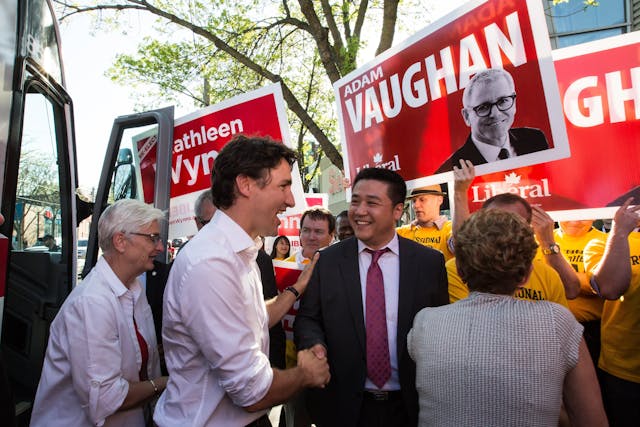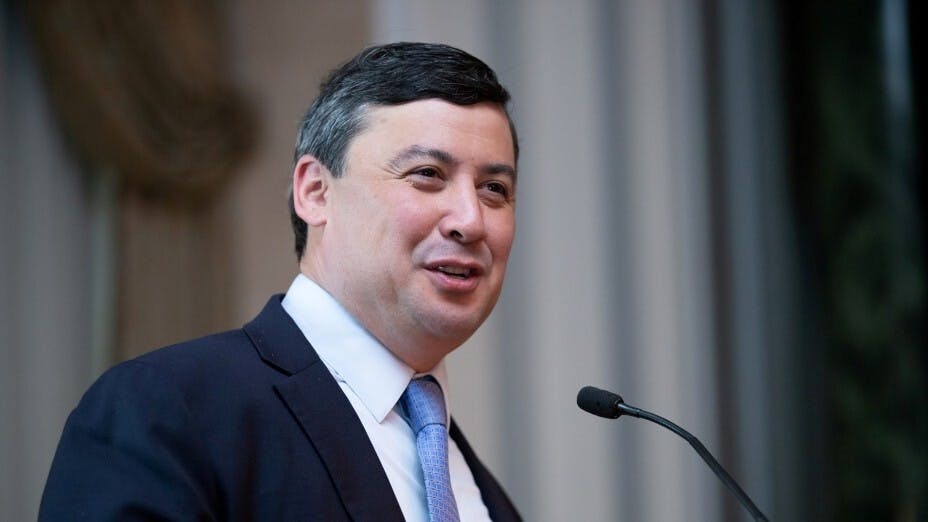近日,加拿大在野保守黨國會議員莊文浩(Michael Chong)在港親屬懷疑被騷擾事件,導致中加關係驟然惡化,加拿大驅逐中國外交官,中國針鋒相對, 驅逐一名加拿大駐上海外交官。
加拿大《環球郵報》早前稱,中國政府針對一名批評北京對新疆政策,並於2021年2月投票支持譴責中國涉疆政策議案的國會議員莊文浩。這場外交風波便突然爆發。
該報援引加拿大安全情報局的一份文件稱,中國駐加拿大外交官趙巍試圖對莊文浩及其在香港的親屬進行「恐嚇」──這一嚴重指控引起了人們對加拿大政治的高度關注。
雙方互逐外交官出境
隨後,加拿大聯邦政府將趙巍驅逐出境。外長趙美蘭表示,加拿大「不會容忍外國以任何方式干涉我們的內政」。
在加拿大反對黨的壓力和傳媒的批評下,加拿大政府宣布趙巍為「不受歡迎人物」。 顯然,此舉是一項政治舉措,在保守黨發起攻擊自由黨之際,由總理杜魯多領導的執政自由黨採取了必要措施安撫其政治對手。
針鋒相對地,中國驅逐了加拿大駐上海總領事館領事甄逸慧。
一些加拿大傳媒評論員和一些香港移民評論員認為,整個事件不僅令中加關係惡化,也是未來幾個月兩國貿易戰的前奏。
據加拿大廣播公司最新消息,加拿大安全情報局已聯繫多名國會議員,告訴他們關於外國干預內政的事,聯繫名單包括保守黨前黨領奧圖爾和新民主黨國會議員關慧貞。奧圖爾的姐姐在2021年返回加拿大之前在香港居住多年,而關慧貞則表示她在中國大陸或香港沒有親人。
莊文浩擔任加拿大下議院威靈頓─哈頓山選區國會議員已有19年。2006年,他因不滿一項承認魁北克是加拿大一個「邦國」(nation)的動議辭去政府間事務部長的職務,因為他說他不相信族裔國族主義;莊文浩強調,他相信公民民族主義。(即所有加拿大人應該一律平等,不應存在「國中國」。)
莊文浩說關於他的情報在政府部門之間流傳,儘管杜魯多總理和他的部長們說沒有接到報告。
然而,整個事件產生了一些問題。 首先,不清楚為什麼有關情報沒有向杜魯多匯報,杜魯多似乎成為反對黨和傳媒批評的目標。其次,目前尚不清楚中國官方會如何針對加拿大的國會議員及其親人。第三,如果存在中國「干涉」加拿大內政,目前尚不清楚是怎樣「干涉」的,以及有關當局是否阻止了這種「干涉」。

中加關係的陰霾
莊文浩事件發生前,中加關係已因斯帕弗(Michael Spavor)和康明凱(Michael Kovrig) 涉嫌間諜活動案而受影響。2018年12月,加拿大公民斯帕弗和康明凱在華為副董事長孟晚舟在加拿大被捕後不久在中國被拘留。康明凱在香港一個國際危機組織擔任高級顧問;斯帕弗則經營「白頭山文化交流公司」,該公司的業務包括推廣在北韓旅遊和投資等。
2021年9月,加拿大總理杜魯多宣布,在孟晚舟自加拿大的軟禁中獲釋後不久,斯帕弗和康明凱二人就被釋放了。
斯帕弗和康明凱二人的拘捕與釋放,顯然與孟晚舟在加拿大的命運攸關,有關個案表明,斯帕弗和康明凱二人的事件,與圍繞孟晚舟的國際政治和中美加關係息息相關。
2022年底至2023年初,加拿大有傳媒指中國在多倫多、溫哥華和魁北克設立所謂「海外警察站」。傳媒指,這些稱為「華人服務中心」的「警察站」,針對的是華裔社區和個人,其中一些人可能成為中國警方的目標。
2022年11月,加拿大皇家騎警證實,他們就中國在多倫多設立「警察站」的報道進行了調查。
不過,中國駐加拿大大使館表示,在新冠疫情大流行期間開設了「海外服務站」,以幫助在國外的中國公民解決換領新駕駛執照等問題。
目前尚不清楚這類「服務站」是否由中國地方警察在北京中央完全不知情的情況下營運。對於像中國這樣幅員遼闊的國家,地方警察常常可能在中央當局不知情的情況下開展活動。
另有加拿大傳媒報道,中國試圖干預加拿大2019年和2021年的全國大選,並針對一些具華裔背景的候選人。杜魯多總理受到反對派的批評,他決定任命一名特別調查員,負責向政府提供具體建議。
2023年3月,中國外交部部長秦剛在G20會議期間對加拿大外長趙美蘭表示,「中國從不干涉別國內政,也反對任何國家干涉別國內政」。
儘管中國的官方立場很明確,但加拿大國內政壇最近出現了執政的自由黨和在野保守黨之間的激烈鬥爭。

執政黨與在野黨 展開激烈鬥爭
保守黨領袖博勵治(Pierre Poilievre)3月份表示,只有公開調查才能查明外國「干涉內政」的情況。他甚至在2023年3月6日提出以下聲明:「杜魯多10年前就知道這種干預,因為10年前,杜魯多基金會從一位北京支持的捐助者那裏獲得了20萬加元的捐款,而且因為我們知道北京政府一直在試圖影響和支持杜魯多。」(見CNN報道)
《環球郵報》報道稱,一個以杜魯多的父親、前總理皮埃爾·杜魯多的名字命名的基金會,2016年收到了來自兩名中國商人的20萬加元捐款,用於支持和資助獎學金和領袖訓練課程。
然而,杜魯多辦公室的一位發言人表示,杜魯多在大約10年前投身聯邦政治時退出了該基金會。同時,杜魯多基金會表示,考慮到傳媒的報道和指責,將退還捐款,並維持基金會作為獨立無黨派慈善機構的角色。
客觀地說,在反對黨將矛頭對準自由黨,指責杜魯多總理「容易受到外國干涉」的情況下,一系列指向中國「干涉」的事件是有政治動機的。具體而言,反對黨希望在下屆全國大選中將執政的自由黨趕下台,其競選策略是將自由黨與中國的「干涉」聯繫起來。
反對黨試圖抹黑政府
總而言之,中加關係的突然惡化,主要是因為反對黨試圖將執政黨與所謂的中國「干涉」掛鈎,抹黑加拿大自由黨。通過這樣做,包括政黨和大眾傳媒在內的反對派似乎實現了幾個政治目標:挖掘出涉嫌受外部影響的前一次選舉候選人,警告即將參選的政客(尤其是具有華裔背景的政客)可能受到影響,暴露出自由黨的弱點,將「中國干涉」變成影響加拿大內政和選戰的因素。
儘管激烈的黨派之爭是加拿大內政的標誌,但加拿大和中國的外交官似乎保持相對冷靜。將中國外交官驅逐出加拿大是杜魯多政府的自然反應,而中國驅逐加拿大駐上海外交官則是下意識的反應。實用主義很可能佔上風,兩國之間不太可能發生貿易戰; 疫情大流行結束後不久,兩國的經濟都在逐漸復甦。至少從現在到下次大選都不會有重大突破,因為執政的自由黨不想冒被貼上「易受外來干涉」標籤的風險,自由黨也不想失去選民的支持。 因此,在反對派旨在抹黑和推翻加拿大自由黨的情況下,中加關係在突然的不穩定中仍會保持務實發展。
A sudden twist in Sino-Canadian relations
A recent saga involving Michael Chong, a Member of Parliament (MP) from the Progressive Conservative Party in Canada, led to a sudden deterioration of Sino-Canadian relations in that Canada expelled a Chinese diplomat while China responded in a tit-for-tat pway by expelling a Canadian diplomat in Shanghai.
The incident erupted suddenly when Canada’s Globe and Mail claimed that the government of the People’s Republic of China (PRC) was targeting an MP, Michael Chong, who criticized China’s policy toward Xinjiang and who voted in February 2021 for a motion condemning the PRC.
The newspaper cited an unnamed security source that Zhao Wei, a Chinese diplomat in Canada, attempted to target at Chong and to “intimidate” his family in Hong Kong – a serious accusation that aroused great concern in the domestic politics of Canada.
Then the federal government of Canada expelled Zhao Wei from Canada. Foreign Affairs Minister Melanie Joly said that Canada “will not tolerate any form of foreign interference in our internal affairs.”
The Canadian government declared Zhao Wei “persona non grata” after days of pressure from Canada’s opposition parties and media criticisms. Clearly, the move was a political one, with the ruling Liberal Party led by Prime Minister Justine Trudeau taking a necessary step to placate its political opponents at a time when the Progressive Conservative Party has been launching a campaign to attack the Liberal Party.
In a tit-for-tat move, China expelled Canada’s consult in Shanghai, namely Jennifer Lynn Lalonde.
Some media commentators in Canada and some Hong Kong diaspora commentators have seen the whole incident as not only a deterioration in Sino-Canadian relations but also a prelude to a trade war between the two countries in the months to come.
According to the latest news from the Canadian Broadcasting Corporation, the Canadian security service has begun to reach out to more elected politicians in Canada to brief them on foreign interference. For instance, former Conservative leader Erin O’Toole and New Democratic Party MP Jenny Kwan were contacted for such briefings. O’Toole’s sister had lived in Hong Kong for many years before she returned to Canada in 2021, while Jenny Kwan said she does not have any family member in mainland China or Hong Kong.
Michael Chong has been a MP from the riding of Wellington-Halton for 19 years. In 2006, he quitted his position as a minister in intergovernmental affairs over a motion which recognized Quebecois as a nation inside Canada, because he said that he did not believe in ethnic nationalism. Chong stressed that he believed in civic nationalism.
Chong said that the government’s intelligence report about him was circulated among government departments, although Prime Minister Trudeau and his ministers said that the report was not presented to them.
However, the entire saga raised some questions. First, it is unclear why the intelligence report was not presented to Trudeau, who appeared to be a target of political criticisms by his opposition parties and media. Second, it is unclear how Chinese officials might have targeted the Canadian MPs and their families. Third, if PRC’s “interference” with Canadian politics existed, it is unclear what forms it might take and whether such interference was stopped by the authorities concerned.
The Michael Chong incidence came at a time when Sino-Canadian relations had already suffered from the cases of Michael Spavor and Michael Kovrig. In December 2018, Canadian citizens Michael Spavor and Michael Kovrig were detained in China shortly after the arrest of Huawei chief financial officer Sabrina Meng Wanzhou in Canada. While Kovrig worked for an international crisis group’s office in Hong Kong, Spavor was a director of Paektu Cultural Exchange, an organization that dealt with tourism and investment in North Korea.
In September 2021, Canadian Prime Minister Justin Trudeau announced that the two Michaels had been released from detention shortly after Meng was released from house arrest in Canada.
The detention and release of the two Michaels were clearly related to the fate of Sabrina Meng in Canada – a case showing that the incidence of the two Michaels was tied to the international politics and Sino-US-Canadian relations surrounding Meng.
From late 2022 to early 2023, there were media reports in Canada making accusations on the establishment of so-called “Chinese police stations” in Toronto, Vancouver and Quebec. The media asserted that these “service stations” aimed at Chinese diaspora communities and individuals, some of whom might become a target of the mainland police.
In November 2022, the RCMP in Canada confirmed that they investigated such reports of “service stations” in Toronto.
However, the PRC embassy in Canada mentioned that the “overseas service stations” were opened during the Covid-19 pandemic to help Chinese nationals abroad on issues such as drivers’ licence renewal.
It was unclear whether such “service stations” were operated by local police in China without the full knowledge of the central-level police leaders in Beijing. With a country as large as the PRC, quite often the local police might have operated their activities beyond the knowledge of the central-level authorities.
There were also Canadian media reports saying that the PRC attempted to meddle in Canada’s 2019 and 2021 national elections and to target at some candidates with Chinese ethnic background. Prime Minister Trudeau was under the opposition’s criticism, and he decided to set up an independent special rapporteur with the task of providing the government with concrete recommendations.
In March 2023, the PRC Foreign Minister Qin Gang told the Canadian Foreign Minister Melanie Joly during the G20 meeting that “China never interferes with other countries’ internal politics and opposes any country interfering with other countries’ internal politics.”
Although the PRC’s official position is clear, Canada’s domestic politics have recently witnessed a fierce struggle between the ruling Liberal Party and the opposition Progressive Conservative (PC) Party.
The leader of the PC Party, Pierre Poilievre, said in March that only a public inquiry would find out what happened with foreign “interference.” He went so far as to make the following claim on March 6, 2023: “Justin Trudeau has known about this interference for a decade because it was ten years ago that the Trudeau foundation got its Canadian $200,000 donation from a Beijing-backed donor and ever since we know that the government in Beijing has been trying to influence and support Justin Trudeau.” (see CNN report)
The Globe and Mail reported that a foundation was named after Justin Trudeau’s father, former Prime Minister Pierre Trudeau, had received Canadian $200,000 donation from two Chinese businesspeople in 2016 to support and fund scholarships and leadership programs.
However, a spokesman for Justin Trudeau’s office said that he withdrew his involvement from the named foundation when he participated in federal politics about a decade ago. At the same time, the Pierre Elliot Trudeau Foundation said that, considering the media report and accusation, it would refund the donation and maintain its role as an independent and non-partisan charity.
Objectively speaking, with the opposition party targeting at the Liberal Party and accusing Prime Minister Trudeau of being “vulnerable to foreign interference,” the series of events that pointed to the PRC’s “interference” have political motivations. Specifically, the opposition is keen to oust the ruling Liberal Party in the next national elections, and its campaign strategy is to connect the Liberal Party with the PRC’s “interference.”
In conclusion, the sudden deterioration in Sino-Canadian relations has been attributable mainly to the attempt of the opposition to discredit the Liberal Party in Canada by linking the ruling regime with the so-called PRC “interference.” By doing so, the opposition, including parties and mass media, appears to achieve several political objectives: digging out previous election candidates who were suspected of being influenced by external actors, warning forthcoming candidates (especially candidates with Chinese ethnic background) against the possibility of being influenced, exposing the weaknesses of the Liberal Party, and turning the “Chinese interference” into a factor shaping Canadian domestic politics and electoral rivalries.
Although fierce partisan politics are the hallmarks of Canada’s domestic political development, the diplomats of Canada and China appear to stay relatively calm. While the expulsion of the Chinese diplomat from Canada was a natural response of the Trudeau government, the PRC expulsion of the Canadian diplomat in Shanghai was a kneejerk response. Pragmatism will likely prevail and trade war between the two countries will unlikely occur; both countries’ economies are recovering gradually shortly after the end of the Covid-19 pandemic. However, there will not be a significant breakthrough at least from now to the next national elections, because the ruling Liberal Party does not want to risk being labelled as a regime vulnerable to “foreign interference.” Nor does the Liberal Party want to lose the support of voters. As such, Sino-Canadian relations remain pragmatic amid the suddenly rocky relationship due to the fierce opposition politics aimed at discrediting and toppling the Liberal Party in Canada.
原刊於澳門新聞通訊社(MNA)網站,本社獲作者授權轉載。原文網址:https://www.macaubusiness.com/opinion-a-sudden-twist-in-sino-canadian-relations/



































